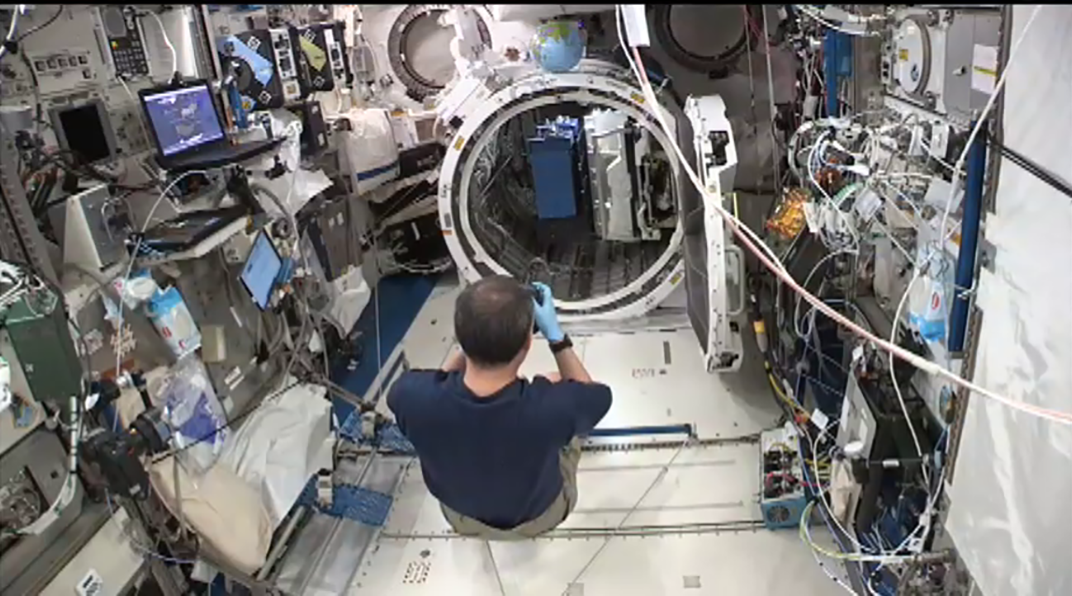Medication may rapidly degrade when exposed to cosmic radiation, according to new research published in Advanced Healthcare Materials. This finding could have significance for future deep space missions, where both astronauts and the supplies they need will be exposed to high levels of cosmic radiation for months or years at a time.
The research was conducted on the International Space Station (ISS) in parallel with laboratory experiments at the University of Adelaide in Australia.
On the ISS, ibuprofen tablets in aluminum blister packs were kept for approximately nine months in two different locations: the interior of the station and the Multipurpose International Space Station Experiment, the latter of which is the outer platform that is exposed to the harsh environment of outer space.
On Earth, ibuprofen tablets were exposed to simulated space radiation for shorter periods of time at greater intensity to simulate “space-equivalent” amounts of radiation. The Earth-based experiments helped the researchers understand the effects of single radiation sources on the tablets.
The researchers found that tablets sealed in aluminum blisters were relatively well-shielded from the effects of radiation while inside the space station. These findings agreed with the simulated laboratory experiments conducted on Earth. On the platform outside of the ISS, however, degradation was up to greater than 50%.
This finding is significant because it could mean similar degradation could occur on deep space missions to the Moon or Mars.
What happens to medicine in space?
Medication degrades on Earth, too, said Volker Hessel, professor in sustainable chemical engineering at the University of Adelaide, who co-authored the study. Degradation of medication over time is the reason why products like ibuprofen have an expiration date. “We found in space, this process is faster and ‘wilder’, meaning more degradation products and more toxic products,” Hessel said.
The medication doesn’t just become weaker, it also degrades into harmful substances. “We found 2-propionic acid that is known to cause skin irritation, serious eye irritation, and respiratory irritation. It is toxic for specific target organs,” Hessel said. “As another example, the detected 4′-isobutyl-acetophenone is a neurotoxic with 10 times higher toxicity than ibuprofen.”
This doesn’t necessarily mean that astronauts won’t be able to take ibuprofen or other medications on long missions into space. Hessel and his co-authors also developed and tested systematically 19 scenarios of “space medicines” made from different ingredients.

The ibuprofen tablets were coated with iron oxide to absorb some of the cosmic rays, helping protect them from accelerated degradation during spaceflight. “We hypothesized that an iron oxide coating of the ibuprofen tablet can scavenge the cosmic rays, as high-atom-number elements commonly do,” he said. “This was successful. Much lower degradation was observed.”
The researchers additionally found that certain flavorings added to the tablets removed or deactivated the damaging molecules produced by cosmic rays, which also helped stop degradation.
“This is an important and timely study as stability of medications during space travel, especially long missions in deep space as those to a 2-3 year Mars mission, is a significant concern due to chemical degradation by cosmic rays in a microgravity environment,” said Jacob Raber, professor of behavioral neuroscience at Oregon Health & Science University, who was not involved in the study.
Raber has authored research on how cosmic radiation might affect astronauts during long missions in deep space.
“While an important step forward, an open question is whether the ibuprofen with increased stability has similar pharmacological, pharmacokinetics, and toxicological profiles,” Raber said. “Future animal studies with the different formulations to test this seem warranted. Ideally, these drugs would be tested in animals exposed to simulated space irradiation and microgravity, as it would be conceivable that the drug responses might be very different in sham/control animals.”
Taking a look at liquid medications next…
Hessel said the next steps for the research include examining the effects of cosmic rays on liquid medicines. “Half of [ISS] medicines are taken by autoinjection, which demands a liquid medicine,” he said. Liquid formulations are less stable than tablets, Hessel said, partly because they are affected by microgravity as well as cosmic rays.
The effects of cosmic radiation on medication is a complex problem that will likely require individual solutions for individual drugs. Ultimately, it is possible that astronauts on long journeys into deep space will need medications that differ significantly from traditional pharmaceuticals.
“Space medicines might have different drugs and ingredients for the same purpose,” Hessel said. “It might be we have to develop some drugs and formulations ‘from scratch’, specific for space.”
Reference: Quy Don Tran, Volker Hessel, et al., Cosmic-Ray Radiation Effects on Ibuprofen Tablet Formulation Inside and Outside of the International Space Station. Advanced Healthcare Materials (2024). DOI: 10.1002/adhm.202402361
Feature image credit: Volker Hessel et al

















